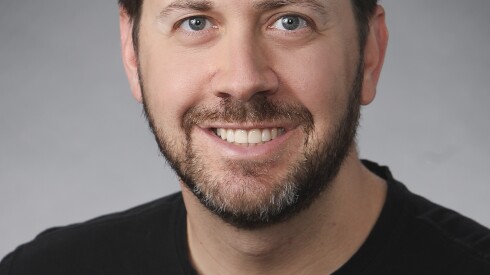Three-time Grammy Award-winning poet, songwriter and 30-year career performance artist J. Ivy, a native of Auburn-Gresham credited for giving acclaimed singer John Roger Stephens the name John Legend, recalls when he first recognized an Artificial Intelligence (AI)-generated semblance of his voice.
A buddy working on a new music track sent J. Ivy — his full name is James Ivy Richardson II — a sample that included a voice “that sounded a bit like me,” said J. Ivy, whose Grammy wins are in spoken word poetry, made history as the first poet to win the category, and is the first poet to win a Grammy in that space since the late Maya Angelou, with additional Grammy moments tied to his collaborations with Kanye West and John Legend. Ivy also has received Telly, Peabody and Gold Clio awards, and an NAACP Image Award for his writing and on-camera narration of a BET documentary about Muhammad Ali.
J. Ivy’s reaction to his AI-generated voice was fierce.
“I didn’t like at all,” said J. Ivy, who the Recording Academy on Aug. 25 appointed co-chair of the Black Music Collective, a group of influential Black artists working to amplify the voices of emerging music creators. “I said, ‘Don’t ever send me anything like that again.’”
His response reflects J. Ivy’s and his wife, two-time Grammy Award-winning and six-time “Showtime At the Apollo” winning singer-songwriter Tarrey Torae’s deeply held beliefs that their voices and talents are God-given gifts, to be held sacred and unadulterated.
“There is a heart of creativity,” said Torae, who grew up in the Auburn-Gresham and Englewood neighborhoods, has co-produced two albums, sits on the Midwest Recording Academy’s Songwriters and Composers Committee, and whose voice has been lauded by John Legend, Kanye West, Stevie Wonder, Patti LaBelle, Mo’Nique, El Debarge and Talib Kweli.
Echoing a favorite phrase from J. Ivy, Torae said, “You’re the only one who sees the world the way you see it.”
“For me,” Torae said, “when you dig deeper, my experience, my pain, my joy, the smell and memories of my mom cooking in the kitchen while she was playing music – that’s the nostalgia,” Torae said. “The first time I fell in love, and the song playing on the car radio while I was driving home. That’s the authenticity that may get tampered with.”
As J. Ivy put it, “I want to make sure my soul is amplified. That’s very important to me.”
At the same time, Torae said she loves to use AI to speed her efficiency in work processes like updating her calendar, organizing data, and moving images.
But she doesn’t use AI in her creative work.
Yet at the same time, automatically generated, low-quality and mass-produced content is starting to make headway on music-streaming services.
What influence will AI-generated music have on the world’s $29.6 billion music market, of which $20 billion comes from streaming?
Chicago attorney Jeff Becker aims to make sure Illinois artists are protected from AI’s potential harm.
Becker played a key role in crafting an amendment to an Illinois state law, the Illinois Right of Publicity Act, that prohibits AI or a similar technology from being used without an artist’s permission to create a digital replica of the artist’s voice, likeness or image or to use such a replica in a sound recording or audio-video work. The law also punishes anyone who helps spread, circulate or distribute such digital replicas without permission.
“It’s aimed at protecting artists from having their voices used without permission,” said Becker, a native of northwest suburban Wheeling who is a partner and chair of Chicago law firm Swanson, Martin & Bell’s Entertainment and Media Law Practice Group. Becker, who serves as vice president of the Board of Governors for the Midwest Recording Academy and chairman of the board’s advocacy committee, has been regularly included on Billboard magazine’s Top Music Lawyers list.
He also teaches music law and transactions at his law-school alma mater, DePaul University’s College of Law.
“If someone uses AI to create a song that violates someone’s rights and puts it on Spotify, they are liable,” Becker said. “If a company that makes the AI software knowingly sells or makes it available to the person who used it for illegal purposes, it can be liable too.”
The law gives platforms such as Meta, Spotify and Apple Music a certain period of time in which to take down music that violates the new law, or they, too can be held liable.
Becker said it’s also important that Congress pass newly introduced federal legislation, the “No Fakes Act,” which would prohibit computer-generated copies of artists’ work on a national level.
It’s a fitting coda for Becker, who was active in theater and show choir in school, and who in 2009 secured a retroactive synchronization license for the late Chuck “The Voice” Roberts, a West Side native known for his House music vocals.


